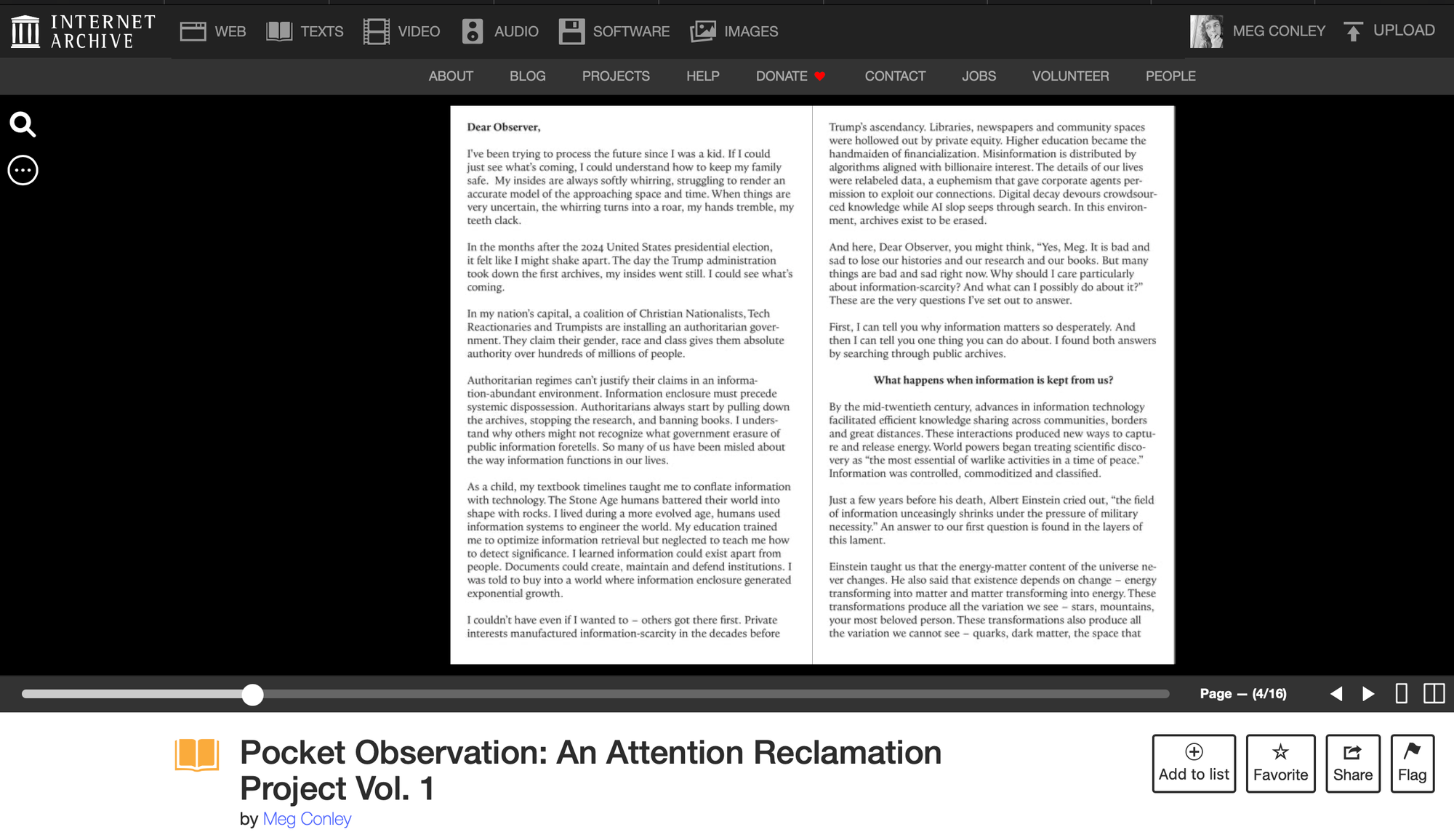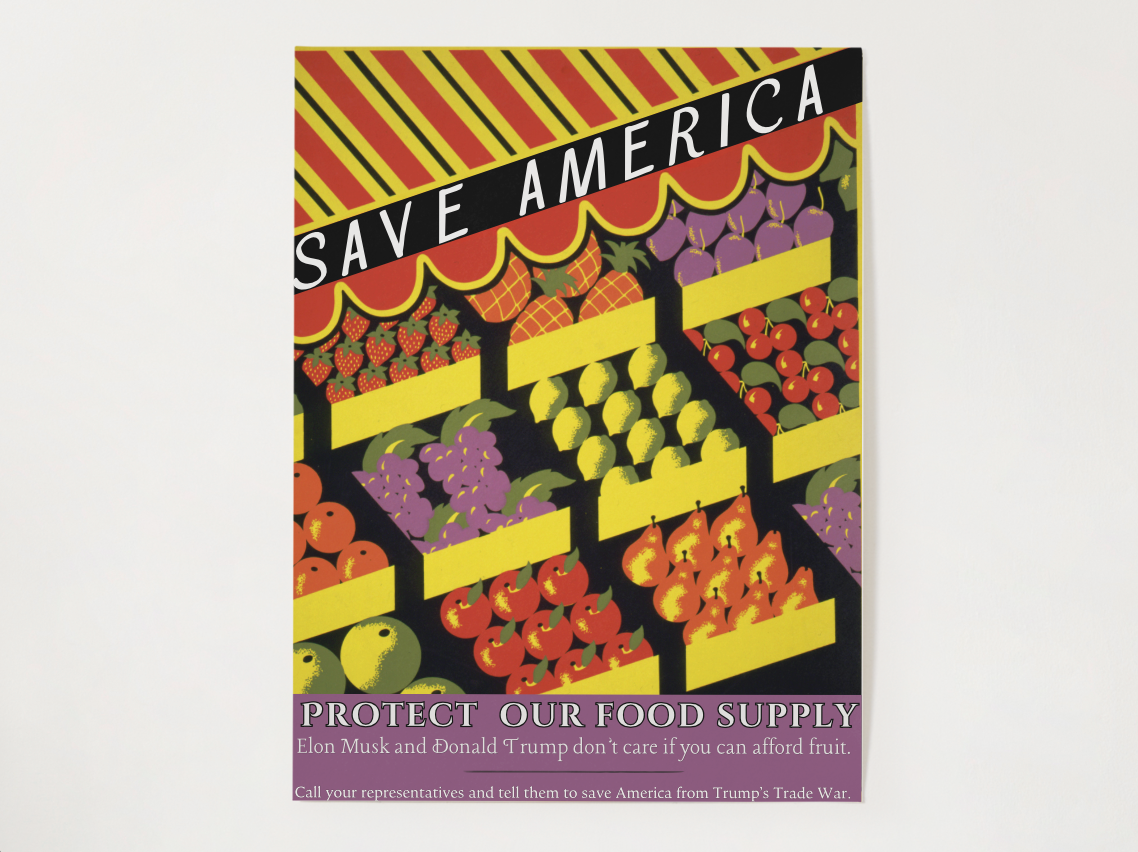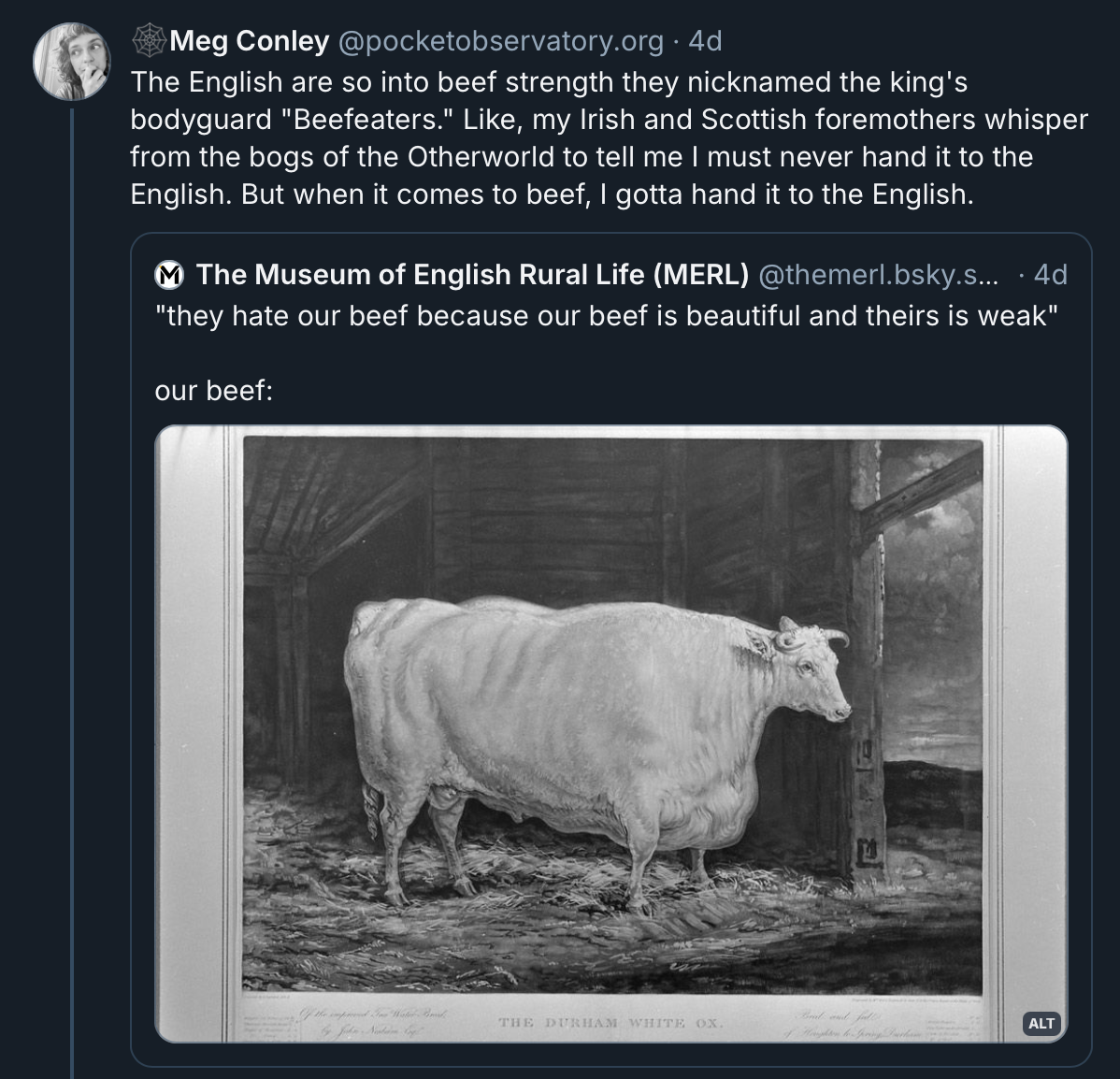I recently published the first volume of Pocket Observation. This month's focus has been on understanding how to keep and share knowledge in the Information Age. In the exclusive essay, I write about why authoritarians seek to shrink the information field. (Want to read the essay on the site instead of in the curriculum? Just head over here!)
Authoritarian regimes can’t justify their claims in an information-abundant environment. Information enclosure must precede systemic dispossession. Authoritarians always start by pulling down the archives, stopping the research, and banning books. - Pocket Observation Vol 1

Over the past few months, the authoritarians in Washington have indeed pulled down the archives, stopped the research, and banned books. They’ve defunded schools and libraries and museums. Trump has thrown out lots of reasons for his trade war but the weirdest might be his claim that groceries are old-fashioned. (????) Really, his trade war is another mechanism being used to shrink the field of information. So we'll dig into that quickly with this pocket note. But first...

The feature image is a WPA poster I reworked for this moment. Feel free to use it however you like. You can find the file on the Internet Archive. Save America is written with a hand drawn font created by Beth Mathews. She also created the font I used for my new Pocket Observatory wordmark! I was so happy when I found her work. I consider my font purchases the best buys of the year. I also really love her newsletter, Show and Tell. (And this is not like a sponsored link or anything. Pretty sure Beth Mathews doesn't even really know who I am...this is just me earnestly sharing a neat artist with you.)
Okay! To the note!
When Trump announced his tariffs, he got weird about groceries. Here’s the quote:
“…likewise…an old-fashioned term that we use groceries, I used it on the campaign, it’s such an old-fashioed term but a beautiful term, groceries, it sort of says a bag with different things in it. Groceries went through the roof and I campaigned on that, I talked about the word groceries for a lot…”
Today as he defended his trade war, Trump returned to groceries,
“I said we’re gonna try to get groceries down. Right? An old-fashioned term but a beautiful term. Eggs!”
Trump is an extreme example, but I truly think one of our big problems is we mostly elect people who don’t do their own grocery shopping or any other routine form of market facing care work. Only an impossibly rich white man could think that shopping for food is a lost folkway.
Not only are groceries not a lost folkway, the grocery store actually a pretty damn new innovation. The word grocer goes back to the 1400s - it meant someone who bought and sold gross goods. A wholesaler, basically. Tea, coffee, sugar, that kind of thing. The modern grocery store couldn’t exist until well into the 20th century! We had to develop technologies that allowed us to grow surplus food, technologies to help us preserve food, technologies to transport that food, and a robust trade system. Trump was born before the modern grocery store was fully realized!
Trump doesn’t even understand groceries in the abstract because he doesn’t understand markets. In the 19th century, an economist asked, “How does Paris get fed?” In a large city that produced almost no food, a majority of people ate enough to survive. And this happened without a centralized body directing the entire process. How?

His answer was specialization, self-interest and free markets. Another iteration of Adam Smith’s invisible hand. Now, I’ve got some beef (Weak beef? Strong beef?) with this economist’s answer to the how does Paris get fed question. Maybe we can get into that another time! For now, I’ll just say that I like the question. Because the answers tell us one of the neat things about markets. They are information systems that are particularly adept at handling dispersed information required by the division of labor.
And let me just go on the record with this - division of labor is great! I love buying goods from other people! I love not growing all my own food. Subsistence farming is a grinding, starving thing. I love being able to buy fruit at the grocery store! I love buying bags of flour! I love not starving!
Markets are very good at facilitating the communication and documentation we need to know who is providing what we need, helping people to know what to provide, and at what cost. So, no one must be assigned to provide flour in a market where people want flour. People will grow wheat, people will process the wheat, people will buy the flour. The division of labor creates a lot of interdependence!
Interdependence requires lots of trust. Like, I don’t process the flour I use, so how do I know it isn’t adulterated with chalk? This is one of the places good government comes in! The government canmake sure no one is adding chalk to the flour. Our government does this kind of work with federal agencies like the FDA. Or at least it did, until DOGE and RFK Jr gutted them.
The US market does not exist in theory. It exists in reality. And reality is as messy as the people who create it. There are lots of incentives that impact what we see in our grocery stores each day. Documentation, especially branding, is often misleading or outright misinformation. Our needs and wants can be influenced in ways we are still discovering. There are lots of valid ways to feel about all of that! (And I’ve written about it in other pieces! Like this one!)
But the grocery store is anything but old-fashioned. It is one of the major innovations sitting at the intersection of markets and the information technology. Trump is either too dumb to understand this, or he is spreading particularly stupid propaganda. Either way, by the time he’s done, I think we’ll all be asking,
“How does America go hungry?”
A little more on Trump's Tariffs
Tariffs are a mechanism that make sense in some contexts – protecting medical supply chains in case of national emergencies, for example! I am not writing about those contexts today. Today, I am talking about Trump’s 2025 tariffs.
What is a trade deficit?
Trump says that it is very bad that America has a trade deficit with so many countries. What is a trade deficit? Great question! That just means we buy more from a country than it buys from us.
A simple way to look at this?
Let’s say I spend $150 at the stationery store every year. I spend that money because I use objects from the stationery store. But also! Crucially! Because I have that money to spend. I have enough money to be a consumer.
Okay, the stationery store buys stuff from stationery wholesalers, but never buys anything from me. Okay! Well, that makes sense! I have nothing the stationery store needs. So there is a $150 trade deficit between me and the stationery store.
Trump’s numbers are bad
Trump knocks on my door and says, “Hey, this is very bad. You’re getting ripped off. That stationery store isn’t buying anything from you. I am going to impose a tariff on all purchases from that store to make up for this trade deficit! You will pay the tariff to me! And it will remain until there is no trade deficit!”
There is no way for me to get rid of the trade deficit, because as I mentioned, I do not make anything the stationery store could possibly need. So, I’ll need to deal with the tariff.
Trump’s tariffs raise the tariff rate for goods to an average of 24%. So…let’s use that average in this example. Trump imposes a 24% tariff on all goods I purchase from the stationery store. That’s a tax on me! My $150 purchase becomes a $186 purchase. I pay $150 to the stationery store and $36 to Trump. (The stationery store does not pay the tariff! This is an important part of tariffs that many people don’t understand.)
And my life becomes much poorer because of this. I can’t make my own pencils, pens or paper. I don’t have the resources – no graphite in my backyard! - or the manufacturing capacity – I have a house with a paper mill attached!
But also, I don’t WANT my work to be making pencils and paper. I want to use pencils and paper to do my work – which is more fulfilling but also pays more than if I were making pencils and paper.
So ultimately, I will continue to buy pencils and paper but they will cost me much more and so I will have to make do with much less.
This simple example obviously doesn't scale up to explain tariffs in the context of global trade perfectly. But the fundamentals are sound. And it illustrates what is happening with Trump's tariffs pretty well! Because there is no complexity there! There is only Trump's Ego As Tariff. And Trump's ego forking hates Americans. When Trump rails against a trade deficit, he is railing against our ability to purchase what we need and want to consume. And he wants to use tariffs to punish us for needing and wanting.
Trump’s numbers are bad and malicious
Trump claims he decided on his tariffs by dividing each trade deficit by the value of goods the US imports from that country. This policy would make no sense, even if it were true. But it is not true.
A conservative think tank reported that instead of using the wholesale import price in their formula, Trump’s administration used the RETAIL price. The retail price is the cost of a good after it has been imported and distributed. That cost includes all the US-based transportation, labor, retail space etc that gets passed onto consumers.
Which is just so….detached from any economic policy or trade theory. But is very attached to a very specific kind of hatred for people who must purchase things and do not have approximately one billion dollars.
Like, Trump’s malicious math means that when a mother buys a banana, she is penalized because of where the banana came from AND ALSO BECAUSE THE BANANA IS ON A SHELF IN THE UNITED STATES. She pays a tax for the import of the banana and a tax for the distribution of the banana! Bulllllshit.
Okay, but Trump says that manufacturing will come back and I’ll get to be part of the middle class again! Isn’t that worth an expensive banana?
It might be, if it was true. But it’s not. Manufacturing was already coming back in a meaningful sense – his tariffs have killed that come back. Factories are being canceled! Manufacturing in the US is heavily automated. If Nike moved all their factories from Vietnam and India to America, they would also be mostly automated. Also, Nike won’t move all their factories.
And finally, why would manufacturing bring back the middle class? The middle class didn’t disappear because of a loss of factories. The middle class disappeared because of a loss of worker rights.
“People don't miss manufacturing jobs. They miss the effects of having 30+ percent union density. And we can build worker power again, with good policies, for the jobs most working class people actually have today rather than hoping mumbo jumbo will make it 1955 again.” – Osita Nwanevu, contributing editor at The New Republic
We can have the bananas and a middle class! But only if we start organizing to protect one another. The good news? It seems like we are finally starting to gather.

